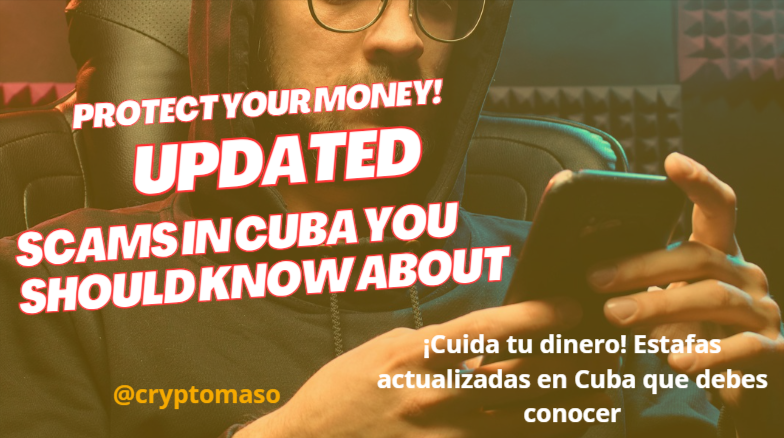English
“Good evening, can you send me back the balance I accidentally transferred to your number? Look, I have an issue with a family member in the hospital 🤕, and I need the money. I was trying to recharge my own phone and didn’t realize my mistake. Check the recharge notification you received…”
This is how a conversation that could end in a scam begins. If you want to learn more about this, I invite you to keep reading.
Internet usage these days is a way of life. People spend a lot of time glued to their phones—every notification pulls us away from our daily tasks, and almost instinctively, we check our devices. Before you know it, you’re already scrolling through social media. This is the reality for many. However, there are different types of electronic device users: those who only use them for calls, those who rely on them for daily activities, and those with above-average technical skills.
Within this last group lurk identity thieves who scam unsuspecting victims without remorse. Often, without taking a second to think, people play along until it’s too late, only realizing they’ve been tricked afterward.
The story I began telling aims to raise awareness about a common scam in Cuba. Here, mobile credit can be transferred, and scammers exploit this. They send a fake SMS mimicking a real recharge, then call the victim with a similar story. The person, believing they received credit, sends it back—even though they never actually got it. Frequently, the scam fails because the fraudster has zero balance, so this type of fraud isn’t always successful.
There are also cases where people with relatives abroad receive calls from someone posing as a company representative, claiming they need to pay an advance fee to receive a package. The victim, tired or half-asleep, doesn’t scrutinize the details and falls for the trap, transferring the requested balance. Later, the package never arrives, and the money is gone.
To safely exchange credit earned from promotions, we need secure mechanisms. However, there’s a lot of misinformation and a lack of cybersecurity awareness. Currently, I use at least three reliable services—created by Cubans—that ensure secure transactions:
@hiveremesas, Qvapay, and the newest,
@hiveremesas These platforms add a layer of security to exchanges. The latter two charge a small fee, but I don’t see it as an expense—rather, as a guarantee of safety and the backing of a team working to prevent fraud.
I thank everyone involved in this effort, and if you’ve made it this far, I encourage you to share this information to raise awareness about online scams. Until next time! Remember: Educate yourself to keep your money safe.

Español
Buenas noches, ¿me puedes enviar el saldo que te mandé a tu número por error? Mira, tengo un problema con un familiar en el hospital 🤕 y necesito el dinero. Estaba tratando de recargarme y no me di cuenta. Revisa la notificación que te llegó de la recarga...
Así empieza una conversación que puede terminar en una estafa. Si quieres saber del tema, te invito a seguir leyendo.
El uso de internet en estos días es una forma de vida. Las personas pasamos mucho tiempo pendientes de nuestros móviles; cada notificación que llega nos saca de nuestras tareas diarias y, casi por instinto, nos hace revisar el teléfono. Cuando te das cuenta, ya estás en tus redes sociales. Esa es la realidad para una gran cantidad de personas. Pero también hay diferentes tipos de usuarios de estos dispositivos: los que los usan solo para llamar, los que los utilizan normalmente para sus actividades diarias y aquellos con un nivel de conocimiento por encima de la media.
En este último grupo se ocultan los principales usurpadores de identidad, quienes tratan de estafar sin remordimientos a los desprevenidos. Muchas veces, sin tomarse un segundo para reflexionar, las víctimas siguen el juego hasta que es demasiado tarde y se dan cuenta de que han sido engañadas.
La historia que comencé a contar busca crear conciencia sobre un tipo de estafa común en Cuba. Aquí, nuestro saldo móvil se puede transferir, y de eso se aprovechan estos estafadores. Envían un SMS falso simulando una recarga de saldo real, luego llaman a la víctima y le cuentan una historia similar. La persona, creyendo que recibió saldo, lo devuelve, aunque en realidad nunca lo obtuvo. Muchas veces, el intento falla porque el estafador tiene saldo cero, por lo que este tipo de fraude no siempre se concreta.
También hay casos en los que personas con familiares en el exterior reciben una llamada de alguien que se hace pasar por representante de una empresa, diciendo que deben pagar un adelanto para recibir un paquete. La víctima, cansada o medio dormida, no analiza bien la situación y cae en la trampa, transfiriendo el saldo solicitado. Luego, el paquete nunca llega, y el dinero desaparece.
Para intercambiar saldo obtenido como premio por publicaciones, necesitamos mecanismos seguros. Sin embargo, hay mucha desinformación y falta de cultura en seguridad informática. Actualmente, uso al menos tres servicios confiables, creados por cubanos, que ofrecen seguridad en el proceso:
@hiveremesas, Qvapay y el más reciente,
@hiveremesas Estos mecanismos añaden una capa de protección en los intercambios. Los dos últimos aplican una pequeña tarifa, pero no lo veo como un gasto, sino como una garantía de seguridad y respaldo de un equipo que trabaja para evitar fraudes.
Agradezco a todos los involucrados en este esfuerzo y, si llegaste hasta aquí, te invito a compartir esta información para crear conciencia sobre las estafas en línea. ¡Hasta la próxima! Recuerda: edúcate para mantener tu dinero seguro.

